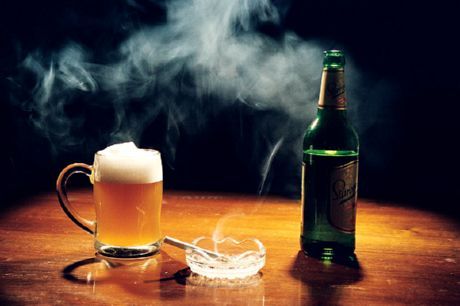
All iLive content is medically reviewed or fact checked to ensure as much factual accuracy as possible.
We have strict sourcing guidelines and only link to reputable media sites, academic research institutions and, whenever possible, medically peer reviewed studies. Note that the numbers in parentheses ([1], [2], etc.) are clickable links to these studies.
If you feel that any of our content is inaccurate, out-of-date, or otherwise questionable, please select it and press Ctrl + Enter.
Smoking and alcohol increase the risk of developing pancreatic cancer
Last reviewed: 01.07.2025
People who smoke a lot and abuse alcohol have an increased risk of developing pancreatic cancer at an earlier age, according to scientists from Michigan State University.

In an article published in the American Journal of Gastroenterology, experts warn that heavy smokers who smoke more than a pack of cigarettes a day were diagnosed with cancer at age 62, while those who drank more than 39 grams of alcohol a day were diagnosed at age 61. This is despite the fact that cancer usually develops in people aged 72.
The fact that pancreatic cancer can take away ten years of life is evidenced by the results of a study involving 811 cancer patients.
According to scientists, this study is another step towards understanding the processes that cause cancer.
While most cancers grow in a more predictable manner, pancreatic cancer is difficult to predict.
Smoking itself is a significant risk factor, and alcoholic beverages provoke oxidative reactions in the liver, which serves as an activator for inflammatory processes that cause cancer.
Thus, well-known risk factors play a significant role in the development of pancreatic cancer, shortening the life of a person who abuses alcohol and tobacco by an average of 10 years compared to people who know when to stop.
In this case, experts considered excessive doses to be alcohol consumption in the amount of 39 milligrams per day (in terms of pure alcohol), and smokers who smoked a pack or more cigarettes daily were considered at risk.
Experts also point out that regular beer consumption increases the risk of developing pancreatic cancer more than other types of alcoholic beverages.
Of course, it is possible to "get out" of this risk zone. This requires giving up all the above-mentioned bad habits, and then a person can breathe a sigh of relief and relax, because after ten years of abstinence, the risk of developing cancer will be equal to the indicators of non-drinkers and non-smokers, as well as vegetarians.

 [
[